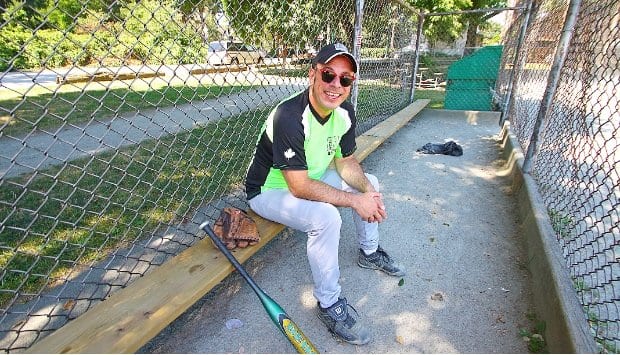I prefer mornings to midnights. My idea of a wild time is an Americano and a good book. If I’m not careful I become hermetic.
“You should join the West End Slo-Pitch Association,” a friend says. He’s been suggesting it for years.
I had been moaning about registering for soccer. I enjoyed myself last year, but at season’s end I came to the conclusion that I don’t enjoy running for extended periods and that I don’t understand the rules of soccer.
I rave to my friend about going to see the San Francisco Giants with my roommate. “Barry Bonds hit a home run right over my head,” I say.
“If you love baseball so much, why are you playing soccer?”
“Because I can see the ball.”
***
My first practice, I’m exiled to right field.
“If the coach has one hand on his hip and taps his foot, it means he’s not impressed,” the roamer in right-centre warns me. “Two hands means he’s pissed.”
I miss every ball that’s hit my way. I become hyper-aware that whenever I run to catch the ball, I let it bounce in front of me, do this really stupid hop, then make a face like a pissed-off teenaged girl.
Three weeks later I feel less like Charlie Brown. Small adjustments shouted at me by my teammates begin to pay off: “Raise your back arm at bat,” “Hold the ball at the narrow part of the stitching when you throw,” and “Keep your glove above your head when you’re catching.”
Then it happens. Our third practice, I catch a fly ball from one of our hardest hitters. I do something I rarely do: strut.
“Next time throw the ball and then dance,” the coach shouts from the mound, one hand on his hip and tapping his foot.
***
Our jerseys are a bright 1980s-pornstar lime green. My number is 69. The average age of our team is 50. I’m the only rookie and I’m 45. I secretly refer to us as The Golden Girls.
I survive opening day without crying. My first time at bat I remind myself, “You’re not 10 years old and this isn’t Grade 4.”
People like me normally avoid competition and live in mortal fear of the mental showdown that happens between a pitcher and a batter. But whether we admit it or not, gay people are in competition with each other all the time. Better to get it out on a baseball diamond instead of letting it build up and throwing a drink in someone’s face.
One nail-biter of a game, we are tied with the first-place team in the bottom of the seventh. The outfield has already prevented two runs from being batted in. With two out and two strikes, a woman from the bottom of the opposing team’s batting lineup manages to sneak a line drive past our shortstop to win the game.
That’s the magic of competition: at any given moment, anyone can be a hero.
***
“How do you feel about jockstraps and chocolate syrup?” I’m asked.
We are rehearsing for the annual Miss WESA pageant. As the lone rookie on the team, I’ve abdicated my duty as our team’s contestant due to internalized homophobia and social media. Instead, I have volunteered to be a backup dancer, because if you are not going to be an athlete in drag, you might as well be a sports bra.
All thoughts of chocolate sauce and jockstraps evaporate after we run through the number a few times. When I get home from rehearsal, my body feels like I’ve just finished a matinee of Cats.
WESA can be competitive, but the real competition happens at the Miss WESA Pageant. It might be all in fun, but make no mistake: those boys want that crown.
The best performance of the evening doesn’t happen onstage, but in the basement of Celebrities when one of the contestants loses her balance in her heels and crashes down onto a Styrofoam piano like a building being demolished.
Once it’s established the contestant hasn’t broken any bones and is helped to her feet, she is rewarded with the applause she deserves.
The last day of the season is hot and dry. I love how the diamond dust clings to my sunscreen, making me feel like a boy again.
We lose all five of our games. No matter how bad the losses are, our team never doubts we can win the next game. We cheer each other on, knowing that all it takes is one good hit, one great play, to salvage this thing.
“We’re a good team,” our coach says as we clap in. “We just need to have faith in ourselves.”
Faith is what it’s all about. You can’t have a good team — or community — without it.
For more information about WESA, visit wesa.net.

 Why you can trust Xtra
Why you can trust Xtra


